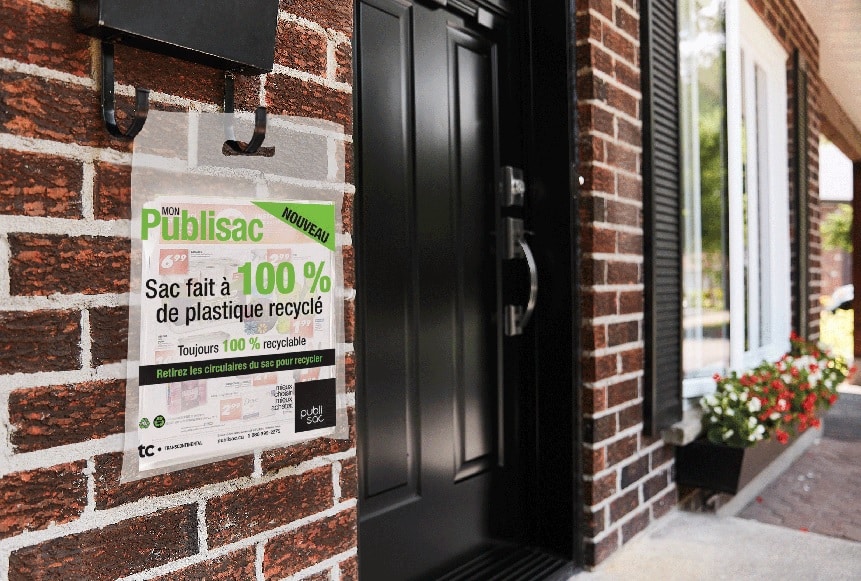
A publisher is condemning it, city leaders are cheering it, and cost-conscious shoppers could find themselves caught in the middle as a new law is set to take effect, which could put an end to home-delivered coupons and ads for hundreds of thousands of consumers.
As newspaper distribution declines, more publishers are delivering coupon inserts and store flyers directly to people’s homes, by stuffing them into your mailbox or tossing them onto your driveway or front porch. But several communities have struggled with ways to deal with complaints from uninterested recipients, and unwanted deliveries that end up littering neighborhoods.
So the city of Montreal, Canada has come up with a way it hopes will solve the problem – do away with often-inadequate opt-out procedures, and require residents who want to continue getting deliveries to opt in instead.
Beginning in May 2023, packets of coupons and store ads will be delivered only to city residents who specifically request them. Those residents will receive a sticker to put on their door – replacing the current system in which residents put a sticker on their door if they don’t want deliveries.
“This regulation will allow us to reduce at the source a significant quantity of paper and plastic in circulation in Montreal,” mayor Valérie Plante announced this week. She said about 800,000 unsolicited advertisements are distributed in Montreal every week, adding up to more than 40 million bundles of paper – together with the plastic bags they come in – that end up in recycling centers and landfills each year. So, for good measure, the new law also bans distributors from packaging their products in plastic bags.
The largest distributor of ads and coupons in the city is condemning the move, saying it could lead to the end of its product altogether.
“An opt-in model is unsustainable because of its complexity and the prohibitive costs it would generate,” TC Transcontinental said in a statement. The company prints and distributes the “Publisac” to millions of residents across Quebec. “In the current inflationary context, and at a time when the population is facing an unprecedented rise in prices, the social and economic relevance of the Publisac is greater than ever,” said Patrick Brayley, Senior Vice-President of the Distribution Group of TC Transcontinental. The company said the current opt-out model remains “a simple and effective method for those who do not wish to receive the Publisac.”
TC Transcontinental says it has already made changes to address environmental concerns, noting that its flyers are printed on newsprint made of sawmill residue, while the bags are made from 100% recycled plastic, and are themselves 100% recyclable.
The battle between the publisher and the city has been brewing for years. Mayor Plante said a 2019 survey conducted by the city showed 82% of residents think the flyers should be delivered only to those who request them. TC Transcontinental conducted its own survey and came up with the completely opposite conclusion – its survey found that 86% of residents support the existing opt-out method. “Contrary to what might be expected in an increasingly digital world, the Publisac continues to be popular,” the company said. “Consumers still prefer the paper format for comparison and planning.” In addition, “without the Publisac, businesses would be deprived of an effective promotional tool.”
The suburban Montreal city of Mirabel switched to an opt-in system in 2019, which TC Transcontinental is challenging in court. But other cities that have considered similar changes ultimately “decided not to adopt the opt-in, as they felt it ran counter to commercial freedom of expression,” TC Transcontinental says.
And that’s what might keep such a system from spreading to the U.S. Back in 2016, a suburban Detroit township began issuing tickets for littering to a local newspaper for delivering “unrequested and undesired newspapers and/or flyers.” The newspaper sued, arguing that “First Amendment protection extends equally to both requested and unrequested speech.” The two sides ultimately settled, with the township agreeing to stop issuing tickets, and the newspaper agreeing to improve its opt-out system.
So other U.S. communities have focused on regulating where and how deliveries can be made, instead of preventing them from being delivered at all. In 2017, a federal appeals court upheld a Lexington, Kentucky law that required all unsolicited materials to be delivered to doorsteps or mailboxes, instead of haphazardly tossed onto properties. And last year, the city of Norman, Oklahoma preemptively announced a plan to separate all of the ads and inserts recovered during a stormwater drain cleanup effort, so it can justify a similar restriction by proving just how many of these unwanted ads end up polluting the city’s storm drains.
As for Montreal, TC Transcontinental hasn’t said whether it plans to pursue a legal challenge to the new law – but it’s suggesting that it might. “We intend to assert our rights and those of our customers if necessary,” the company said. So whether you welcome ads and coupons delivered to your door, or curse the delivery company every time you have to fish them out of the gutter or see them blowing down the street, it seems the search for a solution that will please everyone will continue to be elusive.
Image source: TC Transcontinental














That’s why they aren’t in the actual mailbox – as you see in the photo, that is hung from the piece below the box, which is designed as a NEWSPAPER rack and has been used as that (and the papers are not delivered by the Postal Service, at least not the ones that are put there).
Same goes for the streetside mailboxes that have the slot underneath (many of the newer plastic ones) for the same purpose, or people sticking items into the plastic paper tube that is often found near a street mailbox as well.
To the article – it seems this system would be beneficial to those publishing – since people have to get this sticker from the city, all it would take is a few second call weekly to see what the current number of stickers distributed is, so they know exactly how many copies to print/assemble.
They could also work it out to leave copies with local stores (as our local paper does with the ads for the upcoming week) so people can pick them up there if they want to.
This is not a 1A issue any more than unwarned phone calls are a 1A issue.
My property is mine. Private. No trespassing. No solicitors, no peddlers, NO LITTERING.
If you want to reach me, pay the USPS to deliver your message — just like anyone else.
Do no stuff into my mailbox, behind the flag, hanging from the latch or anywhere else.
Anyone who places mailers (items) in/on USPS mailboxes that do not have proper USPS postage or delivered by USPS employee are subject to this.
https://www.law.cornell.edu/uscode/text/18/part-I/chapter-83
Turn these items into the postal inspector’s office.